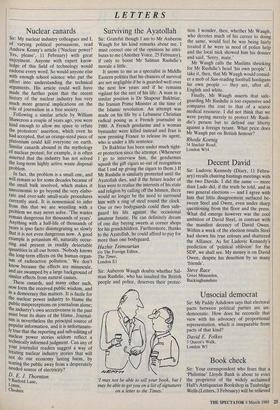LETTERS Nuclear canards
Sir: My nuclear industry colleagues and I, of varying political persuasions, read Andrew Kenny's article (Nuclear power? Yes, please', 11 February) with great enjoyment. Anyone with expert know- ledge of this field of technology would endorse every word. So would anyone else with enough school science who put the effort into understanding the technical arguments. His article could well have made the further point that the recent history of the nuclear industry has very much more general implications on the role of journalism in a free society. Following a similar article by William Shawcross a couple of years ago, you were kind enough to allow me space to refute the protestors' assertion, which even he had accepted, that an orange-sized piece of plutonium could kill everyone on earth. Similar canards abound in the mythology of nuclear protest; for example, it is often asserted that the industry has not solved the long-term highly active waste disposal problem.
In fact, the problem is a small one, and will remain so for some decades because of the small bulk involved, which makes it uneconomic to go beyond the very elabo- rate and over-safe small-scale procedures currently used. It is nonsensical to infer from this that we are wrestling with a problem we may never solve. 'The wastes remain dangerous for thousands of years'. Anything with a half-life of thousands of years is ipso facto disintegrating so slowly that it is not even dangerous now. A good example is potassium 40, naturally occur- ring and present in readily detectable quantities in all our bones. Nobody knows the long-term effects on the human organ- ism of radioactive pollution.' We don't know because the effects are minuscule, and are swamped by a large background of similar effects from natural causes.
These canards, and many other such, now form the received public wisdom, and in a democracy this matters. It is facile for the nuclear power industry to blame the public misperceptions on journalism alone; the industry's own secretiveness in the past must bear its share of the blame. Journal- ism is nevertheless the principal source of Popular information, and it is unfortunate- ly true that the reporting and sub-editing of nuclear power stories seldom reflect a technically informed judgment. Can any of Your journalist readers suggest a way of treating nuclear industry stories that will not do our economy lasting harm, by scaring the public away from a desperately needed source of electricity?
D. E. J. Thornton 9 13urford Lane, Lynn,
Cheshire
















































 Previous page
Previous page